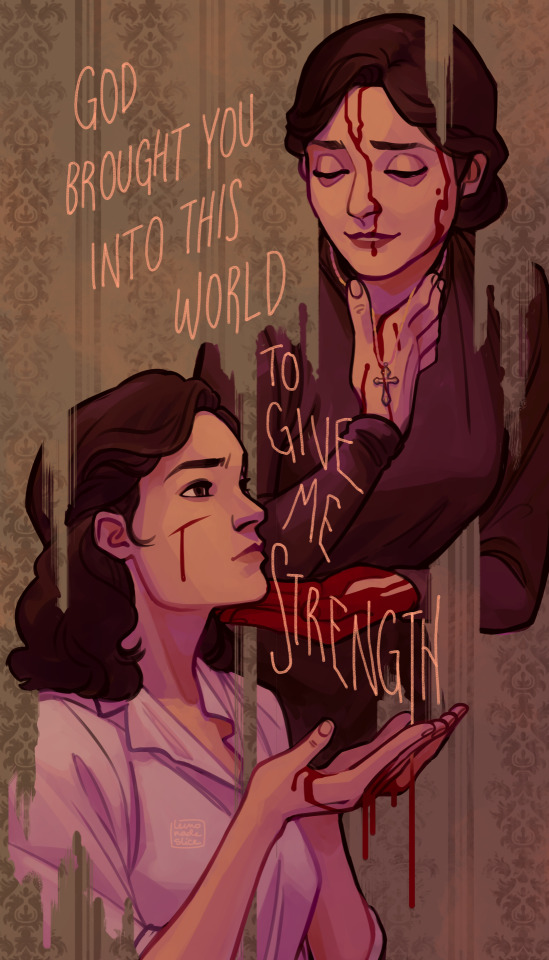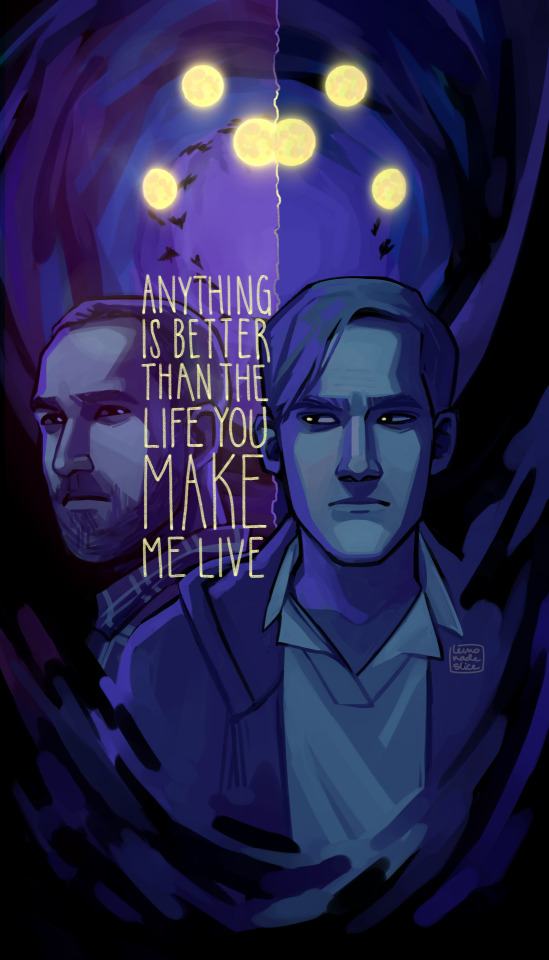#either they are two completely opposed yet inseparable forces or they are two halves of a thing. or both! you know?
Text




siblings in horror: codependent edition
ginger snaps | a tale of two sisters | shrew's nest | the endless
blood-soaked | haunted | ride-or-die
#either they are two completely opposed yet inseparable forces or they are two halves of a thing. or both! you know?#ginger snaps#a tale of two sisters#shrew's nest#the endless#horror#alternate title: codependent relationships with varying fatality rates#also want to take this moment to say i am a ginger apologist (duh) and a monste apologist (ms gomez is so beautiful i could not help it)#i'm not really sure what these are. i like making sets of things. i have been having a godawful month and horror helps a little. wheee#anyway. kisses. see u soon for art fight wrap up. and of course come to art fight in the next ten days if u want an asskicking.#siblings in horror
422 notes
·
View notes
Text
The Star — Literary References Analysis Part 6: Name One Hero Who Was Happy
Welcome to the (probably?) final part of analyzing the literary references found scattered in each of the endings of Cyberpunk 2077. If you haven’t read the other parts, you should do so through the masterpost here! The Devil was rough — straight up an indirect roast toward V for being an idiot. But I’m thankful to report that The Star has a far for optimistic tale.
I found two references, and believe me, I looked everywhere. If I missed something, let me know! Otherwise this part is fairly short. I may move on later to analyze the meanings behind all of Misty’s readings during the credits, but for now let’s dig into the two references I found: Blood Meridian: Or the Evening Redness in the West by Cormac McCarthy, and a portion of The Illiad (Book 9).
The first reference is really subtle, and real easy to miss (I did the first time I played). If you speak to Cassidy before leaving, he’ll say to you:
“See the child. He is pale and thin, he wears a thin and ragged linen shirt.”
He’ll then basically follow this by saying you look like shit, but the family will never turn it’s back on you. This quote is the first line of Blood Meridian: Or the Evening Redness in the West. If that makes your bowels ache and quake like it did mine, then you may be entitled to financial compensation for pain and suffering as a result of being forced to read The Road as a teenager. I don’t know what absolute fuckshit McCarthy was on, but I want none of it. Cormac McCarthy actually ties into Johnny’s story in a really weird way. Not only does McCarthy also have a novel called No Country for Old Men (ring a bell?), but the story of Blood Meridian has striking similarities to Johnny’s past in the wars. Both characters leave whatever childhood they had, for whatever reason, to join an American militia/military situation in their early teens. Both of these wars take place in souther/California Mexico, and our protagonist sees unimaginable horrors. Both barely escape with their lives.
Less related, but you want to know another weird coincidence? The book opens with three epigraphs. The first is by French poet Paul Valéry. Valéry. As in “just-V-only-people-who-really-know-me-can-call-me-Valerie”. Hmm…
There’s a lot more we could do with McCarthy’s novel: Ask ourselves who the Judge in Johnny’s story is (Smasher? Alt? Johnny?), and what it says about the nature of man, violence, immortality, blah blah blah. If that’s something you’re into, have at it. But why does Cassidy say this to you? Why choose the book that haunts AP English students dreams just to tell you that you look like shit? Why mention the idea of a found family having your back in the same breath as a quote from a book that asserts that family absolutely in no way has your back, and that you either die before they do or they’ll let you down in some way (either by dying and leaving you or stabbing you in the back)? Cassidy, a certified literary hoe, would know that Blood Meridian doesn’t exactly have a rosy outlook on family, found or blood.
I think the answer is simple: at the end of the book, we don’t know jack squat.
Just like we don’t know exactly where V’s going, or what Panem’s contacts will be able to pull, we don’t really know what happens to the protagonist at the end of Blood Meridian. Is V truly marked for death? Is Johnny truly gone forever, or is there a chance that his body is out there somewhere, and he could be restored? Is Mikoshi supposed to symbolize hell’s fire or heaven’s grace? (Or something completely different, if we listen to my boi Blake).
It’s such a weird quote to pick, such a weird story to pick. I wish I could derive more meaning from it, but McCarthy isn’t exactly my area of expertise. If anyone more familiar with his work has more to add, please do!
The next piece we find I believe provides more answers to our ending. It is a section of the Illiad, Book 9, found in a shard before you leave with Panem. For those of you unfamiliar with the Illiad, it is about the end of the Trojan War. If you recall, we get another piece of this story in The Devil ending via a section of The Odyssey, which tells the story of Odysseus trying to return home after said war. In this section, Agamemnon has just made a generous offer to Achilles if he aids in helping end the Trojan War, which he has previously refused over a matter of honor. According to Fate, Achilles is slated to die once Hector is slain, which is exactly why Agamemnon needs Achilles to fight since Hector is on some X-games shit. The shard contains Achilles response to the offer of riches, wealth, and the safe return of his favorite slave (who Agamemnon has taken from him):
For my mother the goddess, silver-footed Thetis, telleth me that twofold fates are bearing me toward the doom of death:
if I abide here and war about the city of the Trojans, then lost is my home-return, but my renown shall be imperishable;
but if I return home to my dear native land, lost then is my glorious renown, yet shall my life long endure, neither shall the doom of death come soon upon me.
Aye, and I would counsel you others also to sail back to your homes; seeing there is no more hope that ye shall win the goal of steep Ilios...
Achilles is grappling here with a tough choice; if he stays and fights, he will die a legend. But if he goes home, he will live a long but quiet life.
Sound familiar? What is it going to be, V? Quiet life, or blaze of glory?
The Sun ending seems to be that blaze of glory, much like the ending Achilles’ eventually is forced into. But The Star seems to be the choice of a quiet life; staying with family, living with peace. I like to think that this is the story of Achilles and Patroclus has things not gone awry. A softer, happier, ending for all involved.
But there’s no such thing according to Johnny. Achilles story doesn’t end with the quiet life. Will V’s? According to McCarthy, we’ll never know, and we’re not meant to know. But there are parallels between V and Johnny, Achilles and Patroclus, that are tough to ignore. Achilles meets his demise after Patroclus dresses in his armor, impersonating Achilles, before being struck down by Hector. Achilles, mad with grief over Patroclus, kills Hector, and continues to fight with the ferocity that can only come when one no longer cares if they live or die. His rage threatens the Gods so much they intervene and cause his demise at the hand of Hector’s brother. Achilles’ final request is that his ashes be mixed with Patroclus so that they may become one in the afterlife.
Lots of parallels, right? The merging of two souls — both in life and death. Just as Patroclus adorns Achilles armor, V has the option to dorn Johnny’s clothes (at the very least, obtaining his jacket is not optional), just as Johnny can “wear” V’s body/identity. V even refers to Johnny as “a comrade and a piece of their own soul.” And as time progresses, they are becoming one indistinguishable entity — just as the Greeks believed that each person is one half of a soul, Johnny and V are one half of each other (or the Soul and the Body, inseparable, as Blake would say).
So what is this saying? That they’re both slated to die together? Perhaps. But that doesn’t necessarily mean they’ll fall into the grave together hand-in-hand. I believe that this is meant to give us hope: that V’s salvation is through saving Johnny. If they truly are two halves of one soul, as several other pieces of literature in the game suggest, saving one means saving the other. We don’t know whether V’s new goal is to save Johnny, save herself, or to live out their remaining months quietly (unlikely, especially if you’ve chosen The Sun ending). But I don’t think that saving Johnny and V are going to be opposing goals anymore; just as dooming Patroclus slated Achilles for death, I think the road to both V and Johnny’s salvation are one they must walk together.
#peep the title#Can you tell I recently read song of achilles#he is half of my soul as the poets say#and now I'm crying all over again#cyberpunk 2077#cyberpunk#cyberpunk 2077 v#cyberpunk2077#cyberpunk spoilers#v#v cyberpunk#johnny silverhand#the star#the star ending#cyberpunk meta#cyberpunk 2077 meta
37 notes
·
View notes